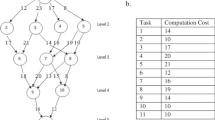Abstract
This paper addresses a specific class of scheduling parallel batching problem, which is observed in steel casting industries. The focus of this research is to minimize the total weighted tardiness on heterogeneous batch processing machines under conditions of dynamic job arrivals, incompatible job families and non-identical job sizes. This type of parallel batching problem arises in a number of different settings, including diffusion in wafer fabrication, heat treatment operations in aircraft industries, and metal working. The problem is viewed as a three stage-decision-problem: the first stage involves selecting a machine from the heterogeneous batch processing machines for scheduling; the second stage involves the selection of a job family from the available incompatible job families; and the third stage involves the selection of a set of jobs to create a batch from the selected job family based on the capacity of the selected batch-processing machine. Since the problem is NP-hard, a few greedy heuristics are proposed. The computational experiments show that the proposed greedy heuristic algorithms are capable of consistently obtaining near-optimal solutions (statistically estimated) in very reasonable computational time on a Pentium III 650 Mz with 128 MB RAM.
Similar content being viewed by others
References
Pinedo M (1995) Scheduling: theory, algorithms and systems. Prentice-Hall, New York
Oey K, Mason SJ (2001) Scheduling batch-processing machine in complex job shops. In: Proceedings of the 2001 Winter Simulation Conference, pp 1200–1207
Lawler EL (1977) A “pseudo polynomial” time algorithm for sequencing jobs to minimize total tardiness. Ann Discrete Math 1:331–342
Gravel M, Price WL, Gagne C (2000) Scheduling jobs in an aluminium foundry using a genetic algorithm. Int J Prod Res 38(13):3031–3041
Voorhis TV, Peters F, Johnson D (2001) Developing software for generating pouring schedules for steel foundries. Comput Ind Eng 39:219–234
Krishnaswamy KN, Raghavendra BG, Srinivasan MN (1998) Development of DSS for production planning and control for SECALS. Project Report. Dept of Management Studies, Indian Institute of Science (IISc), Bangalore, India
Shekar GL (1998) Planning and scheduling systems for steel casting production — a new paradigm. Dissertation, Dept of Management Studies, IISc, Bangalore, India
Duenyas I, Neale JJ (1997) Stochastic scheduling of a batch-processing machine with incompatible job families. Ann Oper Res 70:191–220
Uzsoy R (1995) Scheduling batch processing machine with incompatible job families. Int J Prod Res 33(10):2685–2708
Fanti MP, Maione B, Piscitelli G, Turchiano B (1996) Heuristic scheduling of jobs on a multi-product batch-processing machine. Int J Prod Res 34(8):2163–2186
Hung Yi-Feng (1998) Scheduling of mask shop E-beam writers. IEEE Trans Semiconductor Manuf 11(1):165–172
Kempf KG, Uzsoy R, Wang CS (1998) Scheduling a single batch processing machine with secondary resource constraints. J Manuf Syst 17(1):37–51
Mehta SV, Uzsoy R (1998) Minimizing total tardiness on a batch-processing machine with incompatible job families. IIE Trans 30:165–178
Devpura A, Fowler JW, Carlyle MW, Perez I (2000) Minimizing total weighted tardiness on single batch process machine with incompatible job families. In: Proceeding of the Symposium on Operations Research, Dresden, Germany, pp 366–371
Kim HU, Kim YD, Kim JG (2000) Batching and scheduling at a batch processing workstation in a semiconductor fabrication facility producing multiple product types with distinct due dates. In: Proceedings of the International Conference on Modeling and Analysis of Semiconductor Manufacturing (MASM), pp 151–156
Azizoglu M, Webster S (2001) Scheduling a batch processing machine with incompatible job families. Comput Ind Eng 39:325–335
Dobson G, Nambimadom RS (2001) The batch loading and scheduling problem. Oper Res 49(1):52–65
Zee DJ, van der, Van Harten A, Schuur PC (2001) On-line scheduling of multi-server batch operations. IIE Trans 33:569–586
Boudhar M (2003) Dynamic scheduling on a single batch processing machine with split compatibility graphs. J Math Model Algorithm 2:17–35
Jolai F (2005) Minimizing number of tardy jobs on a batch processing machine with incompatible job families. Eu J Oper Res 162:184–190
Balasubramanian H, Monch L, Fowler J, Pfund M (2004) Genetic algorithm based scheduling of parallel batch machines with incompatible job families to minimize total weighted tardiness. Int J Prod Res 42(8):1621–1638
Mathirajan M, Sivakumar AI, Chandru V (2004) Scheduling algorithms and sensitivity analysis for heterogeneous batch processors with incompatible job families. J Chin Inst Ind Eng 21(1):18–26
Perez IC, Fowler JW, Carlyle WM (2005) Minimizing total weighted tardiness on a single batch process machine with incompatible job families. Comput Oper Res 32(2):327–341
Mathirajan M, Sivakumar AI (2003) Scheduling batch processors in semiconductor manufacturing — a review. In: Proceedings of the Singapore MIT Alliance (SMA) — 2003 Symposium, National University of Singapore, Singapore, 17–18 January, available online at https://dspace.mit.edu/handle/1721.1/3755
Sarvesh G (1999) A heuristic-based approach for scheduling heat treatment furnaces in a toundry. M.Tech Project Report, Dept of Management Studies, IISc, Bangalore, India
Rardin RL, Uzsoy R (2001) Experimental evaluation of heuristic optimization algorithms: a tutorial. J Heuristics 7(3):261–304
Chandru V, Lee CY, Uzsoy R (1993) Minimizing total completion time on a batch processing machine. Int J Prod Res 31(9):2097–2121
Zanakis SH (1977) Computational experience with some nonlinear optimization algorithms for deriving maximum likelihood estimators for three parameters Weibull distribution. Times Studies Manage Sci 7:63–77
Zanakis SH (1979) A simulation study of some simple estimators of the three-parameter Weibull distribution. J Stat Comput Simul 9:419–428
Zanakis SH, Mann N (1982) A good simple percentile estimator of the Weibull shape parameter for use when all three parameters are unknown. Naval Res Logist Q 29:419–428
Golden BL, Alt FB (1979) Interval estimation of a global optimum for large combinatorial problems. Naval Res Logist Q 26:69–77
Author information
Authors and Affiliations
Corresponding author
Rights and permissions
About this article
Cite this article
Mathirajan, M., Sivakumar, A.I. Minimizing total weighted tardiness on heterogeneous batch processing machines with incompatible job families. Int J Adv Manuf Technol 28, 1038–1047 (2006). https://doi.org/10.1007/s00170-004-2452-5
Received:
Accepted:
Issue Date:
DOI: https://doi.org/10.1007/s00170-004-2452-5



